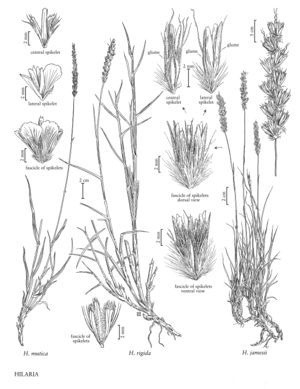Difference between revisions of "Hilaria rigida"
FNA>Volume Importer |
FNA>Volume Importer |
(No difference)
| |
Revision as of 20:25, 24 September 2019
Plants perennial; cespitose, sometimes rhizomatous. Culms 35-250 cm, decumbent, much branched above the base, becoming almost woody; upper nodes glabrous or villous, hairs to 1.5 mm; lower internodes tomentose. Ligules 1-2 mm, densely ciliate; blades 2-10(16) cm long, 2-5 mm wide, flat basally, involute distally. Panicles 4-12 cm; fascicles 6-12 mm. Lateral spikelets with 2-4 florets, lower 2 florets staminate, other florets (if present) usually ster¬ile; glumes thin, membranous, not fused at the base, lanceolate or parallel-sided, 7-veined, awned, awns exceeding the glume apices, apices 2-4-lobed, lobes acute to rounded, long-ciliate, sometimes with 1-3 excurrent veins that form additional slender awns to 1.8 mm; lower glumes with dorsal, divergent awns; upper glumes with subapical awns; anthers 3, 4-4.5 mm. Central spikelets equaling or exceeding the lateral spikelets, with 1 stipitate, bisexual floret; glumes thin, membranous, narrow, deeply cleft into few-several acuminate, ciliate lobes and slender awns; lemmas often exceeding the glumes, thin, ciliate, 2-lobed, midveins excurrent. 2n = 18, 36, 54.
Discussion
Hilaria rigida grows in deserts and open juniper stands, at low elevations, from the southwestern United States to central Mexico. Although almost shrubby, it is very popular with pack horses.
Selected References
None.
